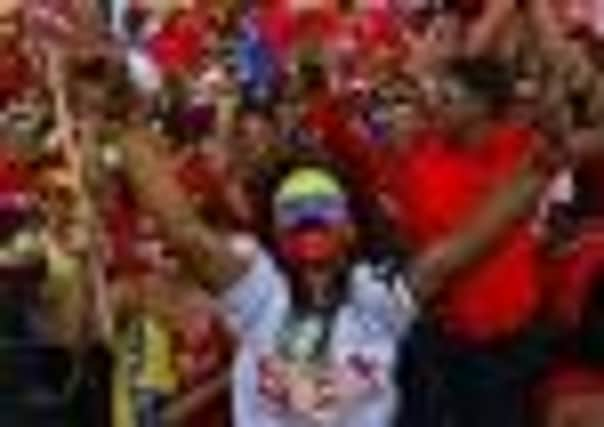Venezuela to pick new leader as Chavez’ ghost looms


The double-digit polling lead which the late-president’s anointed successor has enjoyed since Mr Chavez’s death has shrunk to nine percentage points, casting doubt over a result previously thought secure.
In his campaign-closing speech before hundreds of thousands red-shirted chavistas gridlocking the centre of Caracas, Nicolas Maduro, true to the last to his campaign strategy, spoke of little more than Mr Chavez.
Advertisement
Hide AdAdvertisement
Hide Ad“Chavez is the Christ of the people”, he proclaimed from his podium, an image of the departed leader close by, “What a Maradona Venezuela now has! That we have a constitution and he gave it to us.” His opponent has achieved a late surge in support as a result of his strong campaigning on the issue of violence in the socialist country, a soft spot for a people living within one of the world’s highest murder rates.
In a politically polarised country, Henrique Capriles has attempted during his brief campaign to unite Venezuelans under banner of the issue. “We are all Venezuelans” is his campaign slogan, heard playing as part of his campaign theme tune on radio stations.
“We are fighting for all the Venezuelans that want to sleep peacefully and live in peace,” he told supporters during a night-time walk held against violence at the start of his campaign. Venezuela saw 21,000 murders last year, more killings than western Europe and the United States combined.
Mr Maduro talks little about the violence, a difficult subject for a candidate campaigning primarily on the legacy of the previous president, part of which was a quadrupling of the murder rate. Instead, the “son of Chavez”, as Mr Maduro has called himself since he registered his presidential bid, chooses to fan the flames of the majority’s positive feeling towards the late-president.
While some Venezuelans are confident in the promises of violence control, the majority which voted against the challenger when he ran against Mr Chavez last October, typically from poorer and more dangerous areas, is less convinced.
“It’s always been like this,” said Irene Pay, a 25-year-old from Baruta, a district of Caracas with little police presence. “How can I have confidence in the government changing anything? No matter who wins on Sunday, on Monday I’m still going to have to be in my house before it gets dark.” While Mr Capriles closed his campaign in the country’s state of Lara, one of only three states in the country to have a non-socialist governor, Mr Maduro ended a trying campaign in the capital.
Both candidates endured physically-exhausting campaigns, made especially tense by the dramatic posturing of both sides since Mr Chavez’s death was announced.
At the opposition candidate’s rally in the Venezuelan capital last Sunday, Mr Capriles was hoarse with the strain of speaking at three rallies a day. “I’m shedding my skin for Venezuela,” he shouted.
Advertisement
Hide AdAdvertisement
Hide AdHis opponent has visited every one of Venezuela’s 24 states. On 8 March, he racked up four states in 24 hours.
Mr Capriles claims he is ahead of Mr Maduro. “The polls are only a snapshot,” he claimed recently, “things move fast”. Most analysts, however, agree that Mr Maduro is the most likely candidate to win.
Mr Capriles needs to convince some one million of the Venezuelans who voted against him last time that Mr Maduro is no replacement for their fallen commander, a feat thought too big for the centrist politician.
“There’s little question that Maduro will win,” said head of local private polling firm Datanalisis, Luis Vicente Leon. “The question is what Maduro will be like as president.”